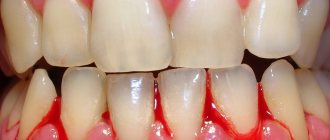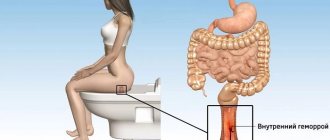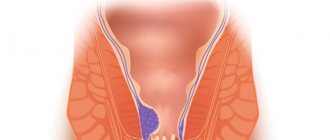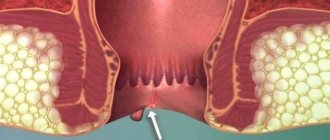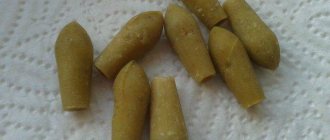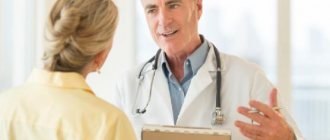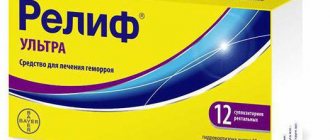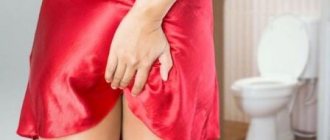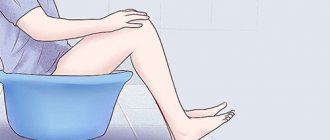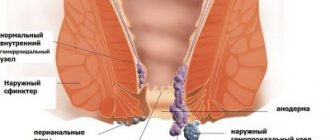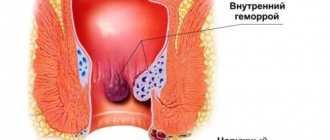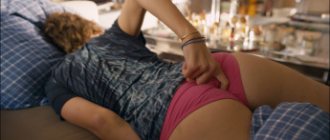After thrombosis of the hemorrhoid, the lump swells and cracks at the most inopportune moment. What to do if hemorrhoids burst?
Prolapse of hemorrhoids is the main symptom of proctological disease
In the rectum, the veins are located in close proximity to the anus. During vein stretching, blood stagnates, which provokes the formation of hemorrhoidal thrombosis. Swollen veins often burst. The disease is complicated by itching and rectal bleeding.
Most often external hemorrhoids appear, less often internal. Hard lumps appear in the anus area, which can break out.
Only a qualified specialist can help cope with such complications.
Self-medication can lead to tissue necrosis and suppuration.
| Course of the disease | Treatment of pathology |
| Node thrombosis | Anticoagulant drugs are prescribed: ointments, suppositories, tablets |
| Bleeding from nodes | Rectal suppositories with adrenaline, sclerotherapy |
| Inflammation of the soft tissue around the node | Painkillers, thrombolytic and anti-inflammatory drugs |
Why can hemorrhoids burst?
Hemorrhoids can burst for a number of reasons, namely:
- constipation _ With constipation, the patient strains strongly during bowel movements, which leads to increased intra-abdominal pressure and increased blood flow to the vessels of the anus. Overcrowded hemorrhoidal cones cannot withstand such a load, so they burst. In addition, external and sunken internal lumps may burst from the lesion with hard feces;
- prolonged sitting . During prolonged sitting, the outflow of blood from hemorrhoids is disrupted, as a result of which they become overfilled with blood and rupture;
- anal sex . The main function of the rectum is to excrete feces. This organ is not intended for sex, since the walls of the rectal canal are thin and do not have glands that produce lubricant. Therefore, during anal intercourse, hemorrhoids can be injured and burst;
- heavy lifting or excessive physical activity . When lifting heavy objects, there is a sharp increase in intra-abdominal pressure and an increase in blood flow to the vessels of the rectum, which can cause rupture of both internal and external hemorrhoids;
- damage to hemorrhoids . External hemorrhoids are damaged and burst more often than internal hemorrhoids, since external lumps are constantly outside and can be injured by tight underwear or clothing, a hard surface of a chair, during sports, etc.;
- pregnancy . In the later stages of pregnancy, the pregnant uterus puts pressure on the vessels of the anus, disrupting the outflow of blood through them, often causing rupture of hemorrhoids. In addition, pregnant women are prone to constipation, which itself can cause hemorrhoids to burst.
- natural childbirth . Bursting hemorrhoids during childbirth are not uncommon, since pushing provokes a sharp jump in pressure in the vessels of the anus.
Thus, we can conclude that rupture of nodes in hemorrhoids most often occurs for two main reasons - injury or increased blood pressure in the cones.
Diagnosis of pathology
The most correct action if the hemorrhoidal node has burst is a visit to the proctologist. This needs to be done as quickly as possible. Indeed, in some cases it is impossible to do without qualified surgical intervention. In addition, if blood comes from the anus, then rupture of the hemorrhoid is not the only cause of this symptom.
If you have rectal bleeding, you should not hesitate to visit a doctor, because other more dangerous diseases can be hidden under the mask of hemorrhoids
Proctological examination includes:
- collection of complaints and medical history;
- inspection and palpation of the perianal area;
- digital rectal examination;
- anoscopy;
- sigmoidoscopy;
- fibrocolonoscopy.
Some of the instrumental examinations may not be carried out if more accessible and simpler methods allow an accurate diagnosis. In any case, the scope of the diagnostic program is determined only by the proctologist.
What to do if hemorrhoids burst and how to stop the bleeding?
The most correct decision if hemorrhoids burst is to seek help from a proctologist. After all, a ruptured node can become an entry point for infection, which can result in complications such as paraproctitis and even blood poisoning.
But it happens that hemorrhoids burst at the most inopportune time, when there is no opportunity to contact a specialist, so the patient must know how to give himself first aid.
If hemorrhoids break out, follow the following algorithm.
For the first 2-3 hours, observe strict bed rest. Avoid any physical activity. It is strictly forbidden to be in a sitting position.
Take a hemostatic drug (Aminocaproic acid, Dicynon, Trenax, Etamsylate).
Cold water or ice will help reduce pain and stop bleeding.
The most effective treatments for bleeding hemorrhoids are the following:
- cold water baths . To do this, pour boiled water, cooled to 18 ° C, into a wide basin and sit in it so that the anus and nodes are completely covered with liquid, and cover the genitals with your hand. You can stay in cold water for no longer than 5 minutes to avoid catching a cold. Such baths are carried out three times a day until the condition improves;
- baths with decoctions of medicinal plants. You can stop bleeding from a node that has burst with a decoction of nettle, burnet and yarrow. To enhance the effect of these herbs, you can add chamomile or St. John's wort, which have an anti-inflammatory effect. The procedure is carried out 3-4 times a day for 7 minutes;
- lotions with cold water . A piece of gauze is moistened in cold water and applied to the anus for 1-2 minutes, repeating the procedure 5-6 times;
- ice compress . An ice pack is wrapped in soft cloth and placed on the anus for 1-2 minutes;
- ice candles . Boiled cold water or a decoction of medicinal plants is poured into candle molds (cardboard cones, finger tips, injection tablets) and placed in the freezer until completely frozen. Such a suppository is inserted into the anus for 20 seconds 3-4 times, this will be enough to stop the bleeding.
Treat the knots with hydrogen peroxide.
Apply hemorrhoid ointment with a hemostatic effect (Relief, Proctosan, Fleming's ointment, methyluracil ointment) to the bursting cones or insert a rectal suppository into the anus (Natalsid, Relief, suppositories with adrenaline). You can also use a hemostatic sponge, which is applied to the external nodes or inserted into the anus.
If you were unable to stop the bleeding from a burst node on your own, then immediately contact a specialist (proctologist, surgeon) or call an ambulance. In addition, you will need professional advice even if your efforts are successful. After all, rectal bleeding may hide more serious diseases than hemorrhoids, for example, rectal cancer.
Consequences and complications
The lack of quality medical care at the moment when hemorrhoids break out is dangerous for the development of:
- Fistula and paraproctitis. The cause of the pathology is the penetration of infection at the site of the rupture. The patient discharges pus with blood. The patient requires immediate medical attention. Delay and self-medication can be fatal.
- Anemia. Occurs when daily blood loss exceeds 50 ml.
- Blood poisoning. Poor disinfection of an open wound allows infection from the rectum to enter the circulatory system.
The lack of quality medical care at the moment when hemorrhoids break out is dangerous for the development of anemia.
If a hemorrhoid has burst again, pain may indicate the development of a malignant or benign tumor or the formation of polyps in the intestine.
How to treat burst hemorrhoids?
After providing first aid, it is necessary to undergo a course of antihemorrhoid therapy. Treatment of hemorrhoids that have burst will be effective, subject to the simultaneous use of systemic and local medications.
Suppositories for hemorrhoids
Rectal suppositories are used primarily for internal hemorrhoids. In this case, these medications must necessarily include vasoconstrictor ingredients (adrenaline, phenylephrine), hemostatic agents (thrombin, prothrombin), astringents and tannins (bismuth compounds).
Today, the most popular and effective anti-hemorrhoid suppositories with a hemostatic effect are the following:
- Relief. This drug contains phenylephrine, which constricts blood vessels and stops bleeding. One suppository is inserted into the anus 4 times a day;
- Proctosan . This medication contains bismuth and titanium compounds, which form a film on the surface of damaged tissues. Thus, the vessels are “sealed” and bleeding stops. The drug is administered into the anus twice a day;
- Natalsid . This drug is made from brown seaweed extract, which has a pronounced hemostatic effect. Suppositories are inserted into the rectum 3 times a day;
- Propolis DN . These homeopathic suppositories consist of mineral oils, propolis and tannins, which help stop bleeding.
Suppositories for hemorrhoids are used for seven days. If necessary, the treating doctor may extend the course of treatment.
Ointment for hemorrhoids
If external hemorrhoids have burst, it is better to use anti-hemorrhoid ointments. Most often in this situation the following drugs are used:
- Proctosan ointment . This drug also contains bismuth and titanium compounds, which eliminates bleeding of hemorrhoids. Proctosan should be applied to burst buds in the morning and evening. In addition, this medication instantly relieves pain and itching in the anus;
- Relief ointment . This ointment has the same composition as the candles of the same name. The drug can be applied to the external bumps or inserted into the anus using a rectal applicator;
- Methyluracil ointment . The main component of the ointment is methyluracil, which has pronounced healing and immunostimulating properties. Thanks to this drug, it is possible to accelerate the healing of anal tears and burst hemorrhoids, thereby stopping bleeding. The ointment is applied to the tissue of the anus and hemorrhoids twice a day until the damage is completely healed;
- Fleming's ointment . This homeopathic ointment consists of zinc oxide, menthol and medicinal plant extracts (calendula, witch hazel, horse chestnut fruit). Fleming's ointment strengthens the vessels of the anus and prevents new episodes of bleeding;
- Procto Glivenol cream.
With the help of these drugs you can stop bleeding, relieve pain in the anus, resolve swelling and speed up the recovery of damaged tissue.
Hemostatic drugs
Treatment of hemorrhoids that have burst and are bleeding should also be carried out with the help of hemostatic drugs.
The drugs of choice in this case may be the following:
- Dicynone;
- Aminocaproic acid;
- Etamsylate;
- Trenaxa and others.
These drugs accelerate platelet adhesion to the vascular endothelium, thereby reducing bleeding time and thrombus formation.
In addition, antihemorrhoidal therapy must be carried out with the use of venotonic drugs, which normalize vascular tone and strengthen their walls. Thus, it is possible to eliminate the main cause of hemorrhoids - venous insufficiency and resolve hemorrhoidal cones.
The following venotonic drugs can be used in the treatment of hemorrhoids:
- Detralex;
- Troxevasin;
- Venarus;
- Phlebodia 600;
- Escusan and others.
Hemorrhoids can be cured only with the help of complex therapy, which is aimed simultaneously at the cause and symptoms of the disease. A proctologist will help you choose the right and effective treatment by performing a number of necessary examinations.
Therefore, at the first signs of varicose hemorrhoidal veins, contact a specialist immediately and remember that self-medication can negatively affect your health. In addition, in difficult cases, especially when complications develop, conservative treatment will be powerless, so it will be possible to get rid of hemorrhoids only through surgery.
Is it possible to treat burst hemorrhoids with folk remedies?
You can try to cope with minor bleeding from burst hemorrhoids using traditional methods, after consulting with your doctor. In the later stages of hemorrhoids, folk remedies will not be effective and can only be used as an addition to the main therapy.
We bring to your attention several methods of treating hemorrhoids with folk remedies.
- absorbable compress with infusion of medicinal plants: 20 grams of sage leaves, oak bark, chamomile and valerian root are poured with boiling water, covered with a lid and left for 30 minutes. A piece of gauze is soaked in the cooled infusion and placed on the burst node for 20 minutes. The procedure is done 4 times a day until the symptoms of hemorrhoids subside;
- baths with oak bark, calendula, sage, yarrow or nettle: two tablespoons of one of the listed components are poured into 300 ml of boiling water and simmered over low heat for 40 minutes, then filtered through a sieve. For the bath you need to use cold solutions. The procedure is carried out in the morning and evening for 7 minutes;
- baths with a weak solution of potassium permanganate;
- ingesting beet, cabbage or potato juice. Drink 100 freshly squeezed juice before meals 3 times a day during an exacerbation of hemorrhoids.
Surgery
Minimally invasive techniques include:
- Cryotherapy.
- Infrared photocoagulation.
- Alloying with latex rings.
- Sclerotherapy.
- Desarterization.
- Laser and radio wave exposure.
- Hemorrhoidectomy using the Milligan-Morgan method.
- Excision of nodes using the Parkes method.
- Operation Longo.
With such interventions, the patient faces a rehabilitation period that requires strict adherence to medical recommendations. After hemorrhoidectomy, recovery can take several weeks, but as a result of Longo's operation, after three or four days the patient's condition returns to normal. Regardless of the type of surgical treatment, during the rehabilitation process the patient must follow a diet, take prescribed medications, avoid heavy physical activity, and perform hygiene procedures.
How to behave if hemorrhoids burst?
A prerequisite for successful treatment of burst hemorrhoids is lifestyle correction, which consists of the following:
- proper and balanced nutrition. With the help of a diet, you can avoid constipation, which is often caused by rupture of hemorrhoids. Therefore, you need to remove from your diet foods that disrupt the functioning of the digestive tract, namely: hot spices and seasonings, fatty and fried foods, smoked foods, pickles, marinades. The menu of a patient with hemorrhoids should largely consist of vegetables and cereals, as well as fermented milk products, fruits and dried fruits;
- sufficient drinking regime. Lack of fluid in the body leads to thickening of the blood and constipation, so a person with hemorrhoids should drink at least 1.5 liters of clean water per day;
- rejection of bad habits. First of all, you need to forget about alcoholic drinks, since they increase the pressure in the vessels of the anus and can lead to rupture of the cones;
- limit physical activity;
- do not lift heavy objects, especially during exacerbation of hemorrhoids;
- do motor exercises during long periods of sitting;
- exclude anal sex.
Hemorrhoids that have burst can cause excessive bleeding, which in turn can cause anemia. Infection of tissues with subsequent development of paraproctitis can also occur. Therefore, it is important to exclude factors that could cause the walls of a hemorrhoid to rupture, and if this happens, immediately go to a specialist and not self-medicate.
How to recognize bleeding from a hemorrhoid
Bleeding from the anus is characteristic of a number of diseases:
- Polyposis of the large intestine.
- Malignant neoplasm in the rectum.
- Villous adenoma in the rectum.
Blood from the anus is characterized by clots. The color of the bloody discharge is dark - from cherry to dark brown. The consistency of the discharge is thick. Brownish impurities are observed. When a hemorrhoidal lump bleeds, the blood comes out scarlet and fresh.
It is required to conduct a special laboratory and instrumental study - colonoscopy, sigmoidoscopy. Based on research, rectal disease and the risk of bursting hemorrhoids are determined.
The appearance of bleeding from the anus does not pose an immediate threat to life. In older people, bleeding develops when blood pressure rises. The body tries to compensate for excess pressure on the walls of blood vessels. It will be safer for the body if the outer vessel bursts.
The volume of blood lost per day exceeding 50 ml leads to the development of iron deficiency anemia. Failure to seek help leads to purulent-inflammatory diseases and fistulas. An experienced proctologist will help stop the bleeding and recommend how to avoid relapses of the disease. The doctor will tell you about proper nutrition, work and rest schedule for hemorrhoids.
